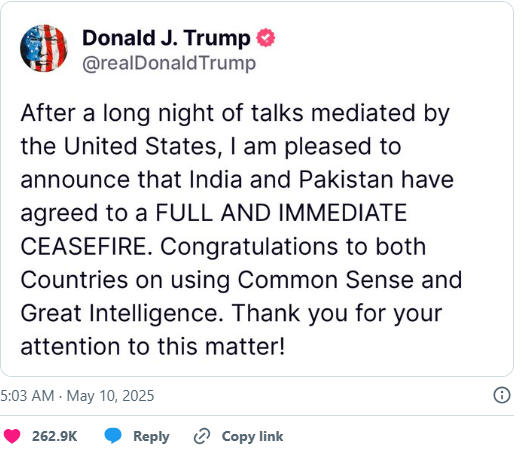India and Pakistan have agreed to a “full and immediate” ceasefire after days of strikes and counter-strikes, according to an announcement by US President Donald Trump.
The agreement comes after weeks of escalating attacks and counterattacks between the two regional rivals.
The ceasefire follows multiple reports of Indian missiles targeting Pakistani air bases, retaliatory Pakistani air strikes, and explosions heard in Indian-administered Jammu and Kashmir. Additionally, Indian authorities confirmed the downing of several enemy drones over Amritsar.
Pakistan has now fully reopened its airspace for all types of flights, with all airports across the country resuming regular operations.
US Secretary of State Marco Rubio revealed that the ceasefire resulted from 48 hours of intensive talks involving top officials from both nations. He stated that both sides had agreed to initiate broader discussions at a neutral venue.
India’s Foreign Ministry confirmed that the Directors General of Military Operations from both countries had spoken and mutually agreed to cease all hostilities—on land, in the air, and at sea—from 17:00 IST (12:30 UTC). Further talks are scheduled for May 12.
Pakistan’s Foreign Ministry also confirmed the agreement, emphasizing its commitment to peace and regional stability, while asserting its sovereignty and territorial integrity.
Trump posted that the ceasefire was the outcome of US-mediated overnight talks, commending both nations for “using common sense and great intelligence.”
Meanwhile, misinformation continues to circulate online, with viral videos misrepresenting events to escalate tensions. Independent fact-checking has debunked several of these misleading clips.
In India, the ongoing conflict has led to a press crackdown, with thousands of social media accounts blocked and numerous news outlets impacted by government action. These measures came in the wake of escalating violence in the Kashmir region, long contested by both nations.
Kashmir’s complex history, marked by multiple wars, failed demilitarization plans, and political maneuvering, remains a core issue in Indo-Pakistani relations. The region was once promised a UN-mandated referendum, but it never materialized. In recent years, tensions reignited with India’s revocation of Jammu and Kashmir’s autonomy in 2019 and a deadly attack on tourists in April 2025.
Overnight shelling reportedly killed 11 civilians in Pakistan-administered Kashmir, while dozens more were injured. Pakistan reiterated that “war is not our priority” and called for peace without the dominance of any side.
India’s military reaffirmed a commitment to non-escalation, contingent on similar restraint from Pakistan, while maintaining a state of high operational readiness.
